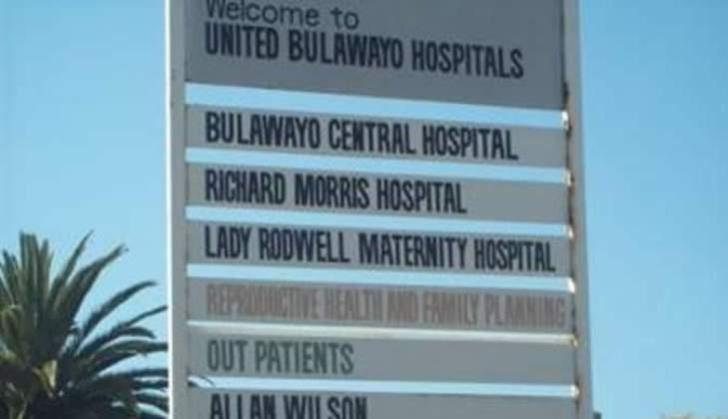News / National
Shocking baby swap scandal rocks Bulawayo hospital, DNA confirms
18 Jan 2025 at 06:24hrs |
8 Views

A shocking case of baby-swapping has emerged from the United Bulawayo Hospitals (UBH), where a new mother from Cowdray Park discovered through DNA testing that she had been discharged with a baby girl instead of her biological son. The mother, who underwent a Caesarean section, raised her concerns immediately after noticing discrepancies with the baby's identification tag, but her fears were initially dismissed by hospital staff.
The incident, which unfolded in October, has sparked outrage and raised critical questions about hospital procedures and accountability.
The mother, whose identity remains undisclosed for ethical reasons, had an ultrasound scan the day before her delivery, which confirmed she was expecting a boy. After the birth, a nurse returned a baby girl, claiming it was hers. Suspicious, the mother immediately alerted staff but was reassured that the effects of anaesthesia might be causing confusion.
Refusing to accept the explanation, the family sought DNA testing, which cost $220 and was conducted at a private laboratory in Bulawayo. The results confirmed the baby girl was not biologically related to the mother.
The hospital was compelled to locate the other mother, who had already been discharged and returned to her home in Esigodini. Initially uncooperative, the second mother and her husband insisted the boy was their biological child. Police were called in, and the couple was brought back to Bulawayo for further investigations.
The hospital then sought additional DNA tests from the National University of Science and Technology (NUST), which confirmed the babies had been swapped. Zephania Dlamini, head of NUST's Applied Genetics Testing Centre, confirmed that the boy matched the Cowdray Park mother's DNA, while the girl belonged to the Esigodini family.
Dr. Solwayo Ngwenya, a prominent medical expert, called the incident a "devastating error" that could have been avoided with rigorous procedures. He highlighted the importance of unique identification tags and strict adherence to protocols immediately after birth.
"Such errors are entirely preventable. Proper training and diligence are critical in ensuring every baby is returned to their rightful mother," Ngwenya emphasized, warning that undetected cases of baby-swapping could have profound social and cultural consequences.
Cultural expert Richard Ndebele added that such incidents disrupt traditional birth rites, which are vital in connecting a child to their ancestral lineage. "This act of deception can bring misfortune to the child and the perpetrators," he said.
The case has prompted calls for improved systems in public hospitals. Retired nurse Margaret Makumbe, who delivered over 10,000 babies during her career, expressed disbelief at the error, citing stringent checks during her time in practice. "Such mistakes were unheard of because we prioritized meticulous attention to detail," she said.
UBH chief medical officer Dr. William Busumani declined to comment, citing patient confidentiality, while Bulawayo's Provincial Medical Director, Maphios Siamuchembu, claimed he was unaware of the incident.
This distressing case has cast a spotlight on the potential for similar undetected errors in Zimbabwe's healthcare system, particularly among families unable to afford DNA testing. It serves as a stark reminder of the importance of safeguarding the trust placed in medical institutions by vulnerable patients.
As investigations continue, the affected families are left to grapple with the emotional and cultural repercussions of this harrowing experience.
The incident, which unfolded in October, has sparked outrage and raised critical questions about hospital procedures and accountability.
The mother, whose identity remains undisclosed for ethical reasons, had an ultrasound scan the day before her delivery, which confirmed she was expecting a boy. After the birth, a nurse returned a baby girl, claiming it was hers. Suspicious, the mother immediately alerted staff but was reassured that the effects of anaesthesia might be causing confusion.
Refusing to accept the explanation, the family sought DNA testing, which cost $220 and was conducted at a private laboratory in Bulawayo. The results confirmed the baby girl was not biologically related to the mother.
The hospital was compelled to locate the other mother, who had already been discharged and returned to her home in Esigodini. Initially uncooperative, the second mother and her husband insisted the boy was their biological child. Police were called in, and the couple was brought back to Bulawayo for further investigations.
The hospital then sought additional DNA tests from the National University of Science and Technology (NUST), which confirmed the babies had been swapped. Zephania Dlamini, head of NUST's Applied Genetics Testing Centre, confirmed that the boy matched the Cowdray Park mother's DNA, while the girl belonged to the Esigodini family.
"Such errors are entirely preventable. Proper training and diligence are critical in ensuring every baby is returned to their rightful mother," Ngwenya emphasized, warning that undetected cases of baby-swapping could have profound social and cultural consequences.
Cultural expert Richard Ndebele added that such incidents disrupt traditional birth rites, which are vital in connecting a child to their ancestral lineage. "This act of deception can bring misfortune to the child and the perpetrators," he said.
The case has prompted calls for improved systems in public hospitals. Retired nurse Margaret Makumbe, who delivered over 10,000 babies during her career, expressed disbelief at the error, citing stringent checks during her time in practice. "Such mistakes were unheard of because we prioritized meticulous attention to detail," she said.
UBH chief medical officer Dr. William Busumani declined to comment, citing patient confidentiality, while Bulawayo's Provincial Medical Director, Maphios Siamuchembu, claimed he was unaware of the incident.
This distressing case has cast a spotlight on the potential for similar undetected errors in Zimbabwe's healthcare system, particularly among families unable to afford DNA testing. It serves as a stark reminder of the importance of safeguarding the trust placed in medical institutions by vulnerable patients.
As investigations continue, the affected families are left to grapple with the emotional and cultural repercussions of this harrowing experience.
Source - the chroncile
Join the discussion
Loading comments…



























